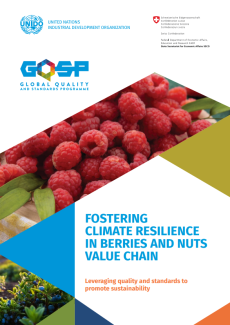Rooted in Resilience: Strengthening Ukraine’s Berry and Nut Sectors Against Climate Change
Climate change is no longer a distant threat – it's a present force, reshaping industries across the globe, and Ukrainian berries and nuts sector is no exception. From erratic weather patterns that disrupt blooming seasons, to rising temperatures that stress crops, climate change is heavily challenging the sector.
Ukraine’s berry and nut industries find themselves at a crossroads. These sectors – particularly promising for the Ukrainian economy – must now adapt to the growing pressures of a changing climate. Their importance goes beyond crops: they are a cornerstone of rural livelihoods and a vital source of export revenues. For farmers, the threat advances quietly, but its long-term consequences are deeply felt across the sector. To ensure the sustainability and competitiveness of the sector in the years to come, adaptation is no longer a choice.
On this note, UNIDO launches the study “Fostering Climate Resilience in Berries and Nuts Value Chain: Leveraging Quality and Standards to Promote Sustainability”. This work provides a comprehensive analysis of how climate change is impacting Ukraine’s berry and nut sectors, and how Quality Infrastructure (QI) can contribute to foster long-term sustainable development.
As a matter of fact, QI supports climate action by establishing and maintaining robust standards, measurement systems, and certification processes that ensure the accuracy, reliability, and consistency of climate-related data and technologies. Through metrology, QI provides precise measurement tools essential for monitoring greenhouse gas emissions, energy efficiency, and environmental parameters. Standardization facilitates the development and deployment of sustainable technologies by defining clear technical requirements and interoperability, enabling scalability and market acceptance. Certification and accreditation build trust among stakeholders by verifying that products, services, and processes meet environmental and climate-specific criteria. Together, these QI components enable transparent reporting, foster innovation, reduce risks, and promote international cooperation.
The study findings emphasize the role of QI to respond to climate change, and particularly the need to align with international standards to boost sustainability, resilience, which ultimately also contribute to ensure Ukraine’s competitiveness in European and global markets.
The research was carried out under the Global Quality and Standards Programme (GQSP) Ukraine, funded by Switzerland’s State Secretariat for Economic Affairs (SECO) and it is designed to inform project interventions, supporting Ukraine’s transition toward a more sustainable and climate-resilient economy.
For more information, please, contact Ms. Dorina Nati (d.nati [at] unido.org)

